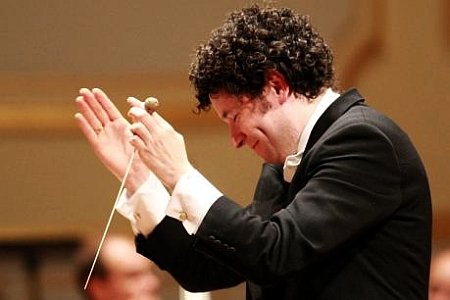It was supposed to be the "Eat Your Heart Out" tour, with guest appearances by Gustavo Dudamel leading the Los Angeles Philharmonic in major U.S. cities. Very quickly, it became the "Sour Grapes" tour, or as some call it the "Schadenfreude" tour.
So what happened between the time when music critics from these metropolises (New York, Philadelphia, Chicago, San Francisco et al) filed their initial raves of the Venezuelan Wunderkind in October and then again, with vastly different assessments, on the May visit to their home turf? Why the change from major to minor, from all-out superlatives to "but, but, buts" (as Musical America's Sedgwick Clark put it, summarizing his colleagues' plaints)?
Same band, same conductor, new verdict.

The question looms even larger when you consider that the orchestra managers in several of those cities tried and failed to sign the man that "60 Minutes" has visited no fewer than three times. Well, one answer might be that Dudamel's celebrity aura is just too hot, too palpable, too critic-proof to go unscathed by those scribes who make their living passing judgment.
Needless to say, all this frenzied attention fuels the most intense rivalry and intrigue among the big-league orchestras - since they're often playing musical chairs with conductors. There's even the widely whispered rumor that after Los Angeles had snapped up Dudamel and after Alan Gilbert had already been signed to helm the New York Philharmonic, its chief administrator tried to lure the hottie away from his West Coast perch.
Neither are the media invulnerable. One need only look at how they raise up and then nearly ridicule the object of their sensationalism - a running joke spells the conductor's initials as G*D, the divinity.
Meanwhile our music arbiters, caught up in ego-provoking games, don't seem to care that their current reviews hardly match up, that they are now surreptitiously eating their words from seven months earlier -- not even allowing that readers have memories.
And, oh yes, they're frantically busy microscoping each other's opinions - lest they not be in collegial stride. (Even the local critic joined the fray after perusing the tour reviews.) So all ye faithful who are captivated by the music this particular podium meister inspires, who roar your amazement in long minutes of curtain calls, but then wait to read from the written record of your city paper's critics whether the concert was any good or not, well, you'll just have to live with wishy-washy fence-straddling. It's called finger-in-the-air, folks. Because now, it seems, your wise guides are taking back the hosannas they've previously lavished on Dudamel.
Still, some of us find it implausible. Some of us are stymied by the sudden, hold-your-horses tour notices just written. The day after the New York Times' Anthony Tommasini faulted Dudamel for allegedly not getting his musicians to play with high-gloss polish -- as the first order of business, he says -- he reviewed the Cleveland Orchestra and lauded that ensemble for its heart and passion, mentioning that spit-perfect virtuosity is not so important after all.
So which way is it? And to think that so many managers, presenters and audiences wait in slavish obeisance to these oh-so-worthy appraisals. True, some critics come in for scorn (live by the word, die by the word) for trying to have it both ways, for cheerleading one minute and taking down the hero in the next.
But if there's a lesson to be found here it's that musical politics is ever alive, that there ain't no such thing as wholly objective criticism. We all remember Leonard Bernstein and how he was hosed for being flagrantly emotional and exhibitionistic, sloppy in his orchestral discipline, over the top in his renderings - only to end up as the gold-plated icon of music, beloved by the most curmudgeonly critics.
Back then they slipped, in unison, from cheering to jeering with time to rise up cheering again - just as they might now. The only thing that's changed is the name. Gustavo meet Lenny.